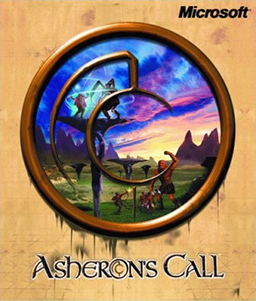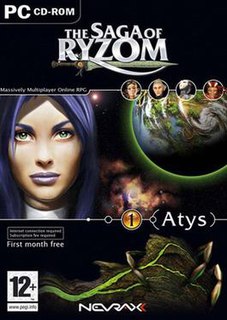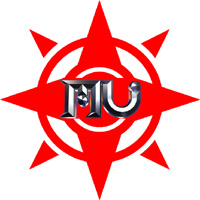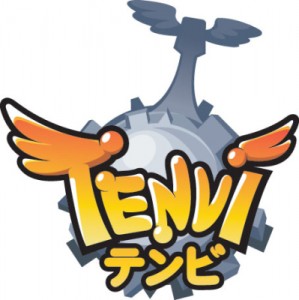
Earthdawn is a fantasy role-playing game, originally produced by FASA in 1993. In 1999 it was licensed to Living Room Games, which produced the Second Edition. It was licensed to RedBrick in 2003, who released the Classic Edition in 2005 and the game's Third Edition in 2009. The license is now held by FASA Games, Inc., who have released the Fourth Edition, with updated mechanics and an advanced metaplot timeline.

Asheron's Call (AC) was a fantasy massively multiplayer online role-playing game (MMORPG) for Microsoft Windows PCs, developed and published by Turbine Entertainment Software. Though it was developed by the Turbine team, it was published as a Microsoft title until 2004. The game was set on the island continent of Dereth and several surrounding smaller islands and archipelagos on the fictional planet of Auberean. The game was played in a large seamless 3D virtual world which could host thousands of players' characters at a time.

Crossfire is a free and open source software cross-platform multiplayer online role-playing video game. Crossfire features a tile based graphic system with a pseudo-isometric perspective. All content is licensed under the GNU GPL-2.0-or-later. The client and server will run in Microsoft Windows, Mac OS X, Linux, IRIX, and an array of other platforms.

Ryzom, also known as The Saga of Ryzom, is a free and open source massively multiplayer online role-playing game (MMORPG) developed by Nevrax for Microsoft Windows, OS X, and Linux.

MU Online is an Isometric medieval fantasy MMORPG, produced by Webzen, a Korean gaming company.

Lineage II is a massively multiplayer online role-playing game (MMORPG) for Microsoft Windows and the second game in the Lineage series. It is a prequel to Lineage and is set 150 years before the first game. It has become popular since its October 1, 2003 launch in South Korea, reporting 1,000,918 unique users during the month of March 2007. To date, the game has been played by more than 14 million users, most of whom are based in Asia.

The Lord of the Rings Online and usually simply referred as LotRO is a massively multiplayer online role-playing game (MMORPG) for Microsoft Windows and OS X set in J. R. R. Tolkien's Middle-earth, taking place during the time period of The Lord of the Rings. Developed by Turbine, Inc., the game launched in North America, Australia, Japan, and Europe in April 2007 as The Lord of the Rings Online: Shadows of Angmar. Players could create characters of four races and seven classes and adventure throughout the region of Eriador. In November 2008, Mines of Moria expansion was released, adding the region of Moria and two new playable classes. It was followed by the Siege of Mirkwood in December 2009. In 2010 the game underwent a shift from its original subscription-based payment model to being free-to-play, with a paid subscription and an in-game store.
Knight Online is an MMORPG developed by Mgame Corporation.
Gekkeiju Online is a 3D MMORPG developed by a Finnish indie software company, Coolhouse in 2003. It incorporates anime-style characters into a medieval fantasy world.

Dungeons & Dragons Online (DDO) is a massively multiplayer online role-playing game (MMORPG) developed by Turbine for Microsoft Windows and OS X. The game was originally marketed as Dungeons & Dragons Online: Stormreach, then renamed Dungeons & Dragons Online: Eberron Unlimited upon switching to a hybrid free to play model, and was finally rebranded Dungeons & Dragons Online, with the introduction of Forgotten Realms-related content. Turbine developed DDO as an online adaptation of Dungeons & Dragons (D&D), originally based loosely on the D&D 3.5 rule set. The game is set on the unexplored continent of Xen'drik within the Eberron campaign setting, and in the Kingdom of Cormyr within the Forgotten Realms campaign setting.

Mabinogi is a massively multiplayer online role-playing game released by Nexon, and developed by devCAT studio. The name of the game is taken from the Welsh word Mabinogi, a Welsh anthology of legend, and the settings for the game are loosely based on Welsh mythology.

ArchLord was a 3D fantasy MMORPG developed by NHN Corporation and Codemasters Online Gaming (COG). The game was released in March 2005 in South Korea and October 2006 in North America and Europe, receiving poor reviews from the gaming press. In August 2007, ArchLord became free-to-play to coincide with the release of the first episodic expansion pack, Season of Siege. The second expansion, Spirits Awakening, was released in August 2008. From August 2009, Webzen published ArchLord in additional countries where Codemasters did not have rights to distribute the game. From October 3 the same year, Webzen maintained ArchLord globally, offering the seventh expansion, called Heaven & Hell. The game has been shut down since January 1, 2014.

Cabal Online is a free-to-play, 3D massively multiplayer online role-playing game developed by South Korean company ESTsoft. Different localizations of the game exist for various countries and regions. Although free-to-play, the game makes use of the freemium business model by implementing an "Item Shop", both in-game and via web, allowing players to purchase special premium coins using real currency, in order to acquire exclusive game enhancements and features, useful items and assorted vanity content.

Dungeon Crawl Stone Soup (DCSS) is a free and open source roguelike computer game and the community-developed successor to the 1997 roguelike game Linley's Dungeon Crawl, originally programmed by Linley Henzell. It has been identified as one of the "major roguelikes" by John Harris.

Tenvi (Korean:텐비) is a Massively Multiplayer Online Role-playing Game released in 2008, in the same vein as MapleStory in that it was also side-scrolling and 2D, but it included many new features. The main differences are enhanced character sprites and the addition of a "Guardian" which followed your character around. On July 24, 2012, Tenvi was shut down, but was reopened as TenviXtreme under TooniLand on November 1, 2012. TooniLand has terminated services as of August 6, 2013.

Turf Battles, often referred to as TB, is a massively multiplayer online role-playing game (MMORPG). It is IMAZIC's first released game first introduced in 2002. Turf Battles takes place within the world of Fomalhaut, years after a major war. Originally published under HyperEngines LLC, The open beta was announced around September 2005. Due to many technical issues, the game ultimately failed, and Hyper Engines LLC closed its operations mid-2008.

Darkfall was a massively multiplayer online role-playing game (MMORPG) developed by Aventurine SA that combined real-time action and strategy in a fantasy setting. The game featured unrestricted PvP, full looting, a large, dynamic game world, and a player-skill dependent combat system free of the class and level systems that typify most MMORPGs. Darkfall had a 3D world environment and contained mild violence. The official Darkfall servers were closed on 15 November 2012.

Jade Dynasty was a free-to-play MMORPG game created by Perfect World. The game's plot was based on a popular Chinese internet novel Zhu Xian. Released in an era where popular MMORPGs were besieged by bots and other problems related to trading of real-world currency for digital goods, Jade Dynasty was notable for replacing traditional click-intensive methods of training with an in-game automation system. This automation system made 3rd-party automation software largely redundant and marginalized the benefits of playing for long hours, instead rewarding smart training methods and efficient algorithmic resource consumption.
PlaneShift is a cross-platform 3D Online Multiplayer Role Playing Game in a fantasy setting. The framework is open source with the server and client released under the GNU General Public License v2, while the artistic content is covered under a proprietary license. All content, however, is available free of cost. The game requires client software to be installed on the player's computer. The project is no-budget and produced by a group of developers guided by the Atomic Blue organization. The development team comprises volunteers from mostly European countries and North America.

Rappelz is a free-to-play massively multiplayer online role-playing game. The game is developed by the Korean company Gala Lab, formerly flavor. It is published in Europe and North America by Way2Bit Co. Ltd. in English, French, German, Italian, Polish and Turkish, on their Bora Island games portal. As of October 2008, Rappelz was also being published by the South East Asia based game publishing company AsiaSoft as RappelzSEA but was later dropped by the company on 1 September 2009. The game was also published in Arabic for MENA gamers by the Emirati company Game Power 7. The game was released under a different title known as Hope of Nations, and was commercially launched on 16 March 2009. A new version was released 15 July 2010 by EagleGame in the Philippines, but the PH/SEA version closed in 2016. As of 6 February 2013 it was confirmed by Rappelz GMs that "Gala Net, Inc. and its subsidiaries Gala Networks Europe and Gala-Net Brazil have been acquired by Webzen, Inc.", however, it is still being developed by Gala Labs and Gala Japan
















